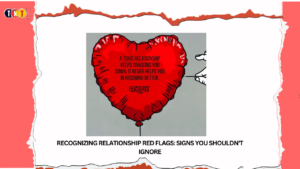Relationships are a fundamental part of human life, providing companionship, support, and love. However, not all relationships are healthy. Some can be detrimental to our well-being, and recognizing the warning signs or “red flags” is crucial in preventing emotional or physical harm.

12 Signs You Shouldn’t Ignore
Relationships are complex, requiring continuous effort, communication, and mutual respect. Here are some key red flags to be aware of in any relationship:
- Lack of Communication: Effective communication is the cornerstone of any healthy relationship. If your partner consistently avoids meaningful conversations, disregards your thoughts and feelings, or becomes defensive when you express concerns, this is a significant red flag. Healthy relationships thrive on open, honest, and respectful dialogue.
- Controlling Behavior: A partner who exhibits controlling behavior can severely undermine your independence and self-worth. This includes dictating what you wear, whom you can see, where you can go, or making decisions for you without your input. Control can also manifest subtly, such as through guilt-tripping or constant monitoring.
- Lack of Trust: Trust is fundamental in a relationship. If your partner constantly doubts your loyalty, accuses you of lying or cheating without evidence, or demands to check your phone and social media accounts, it indicates a lack of trust. This behavior can lead to a toxic environment where you feel perpetually scrutinized.
- Disrespect: Disrespect can take many forms, including belittling comments, disregard for your boundaries, or dismissive attitudes toward your feelings and opinions. A respectful partner values your individuality and treats you with kindness and consideration.
- Emotional Manipulation: Manipulative behavior is a significant red flag. This can include gaslighting (making you doubt your own perceptions and sanity), guilt-tripping, or playing the victim to avoid accountability. Emotional manipulation is a tactic used to control and undermine your confidence.
- Jealousy and Possessiveness: While a little jealousy can be normal, excessive jealousy and possessiveness are not. If your partner is overly jealous, frequently accuses you of flirting or cheating without reason, or tries to isolate you from friends and family, it’s a serious red flag.
- Frequent Criticism and Blame: A partner who constantly criticizes you, points out your flaws, or blames you for their problems can erode your self-esteem. Constructive criticism is healthy, but persistent negative comments and unfair blame are detrimental.
- Lack of Support: In a healthy relationship, partners support each other’s goals and aspirations. If your partner consistently undermines your ambitions, dismisses your achievements, or shows disinterest in your passions, it can be a sign of a lack of respect and support.
- Emotional or Physical Abuse: Any form of abuse, whether emotional, physical, or sexual, is a major red flag. Emotional abuse includes verbal assaults, threats, intimidation, and constant criticism. Physical abuse involves any form of violence or physical harm. If you experience any form of abuse, it’s crucial to seek help immediately.
- Avoidance of Conflict: While constant fighting is unhealthy, avoiding conflict altogether can be equally damaging. If your partner refuses to address issues, avoids difficult conversations, or gives you the silent treatment, it prevents the resolution of problems and can lead to resentment.
- Addiction Problems: Substance abuse or addiction to alcohol, drugs, or other harmful behaviors can severely impact a relationship. If your partner’s addiction is causing problems, and they are unwilling to seek help or address the issue, it can lead to a toxic and unstable environment.
- Dishonesty: Honesty is a vital component of a trusting relationship. If your partner frequently lies, hides things from you, or is deceitful, it undermines the foundation of trust necessary for a healthy relationship.
What to Do if You Find Yourself in a Toxic Relationship
Although we try to avoid these toxic relationships by trying to check out for the signs to know if you are in the right, but you might sometimes find yourself there. Finding yourself in a toxic relationship can be difficult and emotionally draining. Here are some steps you can take to address the situation:
- Acknowledge the Problem: Recognize and accept that the relationship is toxic. Reflect on your feelings and experiences to understand how the relationship affects you.
- Identify Patterns: Take note of specific behaviors that contribute to toxicity, such as manipulation, criticism, lack of support, or control. Understanding these patterns can help clarify your situation.
- Set Boundaries: Establish clear boundaries with the other person regarding what is acceptable and what is not. Communicate these boundaries assertively and consistently.
- Seek Support: Talk to trusted friends, family members, or a therapist about your situation. Gaining perspective from others can help you feel less isolated and more empowered.
- Prioritize Self-Care: Focus on your emotional and physical well-being. Engage in activities that make you feel good and help reduce stress, such as exercise, meditation, or hobbies.
- Evaluate the Relationship: Consider whether the relationship is worth saving. Weigh the positives against the negatives and think about whether there is a possibility for change.
- Communicate Openly: If you feel safe doing so, have an open conversation with the other person about your feelings and concerns regarding the relationship. This may lead to positive changes or clarify your decision to leave.
- Plan Your Exit: If you decide that the relationship is irreparable, plan how to disengage safely. This may involve creating a support system or a strategy for leaving.
- Seek Professional Help: A therapist or counselor can provide valuable support and guidance as you navigate your feelings and the complexities of the relationship.
- Take Action: Decide on the best course of action for your situation, whether that means leaving the relationship, reducing contact, or seeking counseling together.
- Reflect and Learn: After you’ve taken steps to address the relationship, reflect on what you have learned. This can help you make healthier choices in future relationships.
- Stay Committed to Your Well-Being: Regardless of the outcome, keep your mental and emotional health as a priority. Surround yourself with supportive people and engage in activities that enhance your quality of life.
The most important thing is to prioritize your safety and well-being. Trust your instincts and know that you deserve to be in a healthy, supportive relationship.
Conclusion
Recognizing these red flags is crucial for maintaining a healthy and fulfilling relationship. If you identify any of these signs in your relationship, it’s important to address them openly and honestly. Sometimes, seeking the advice of a counselor or therapist can be beneficial. Remember, a healthy relationship is built on trust, respect, communication, and mutual support. Don’t ignore red flags; your emotional and physical well-being should always be a priority.



